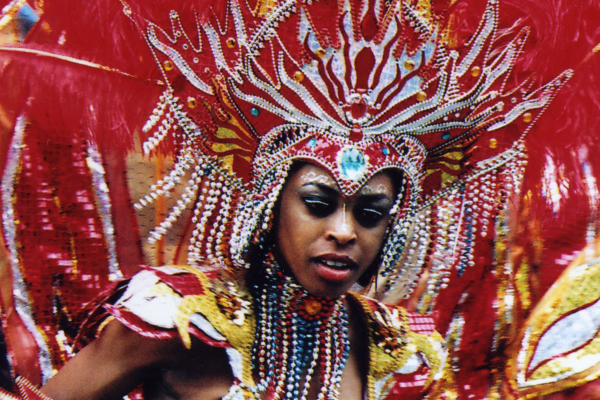"Dancing in the Streets" Explores the Exuberance of Carnival

Kiss gray Ohio goodbye for a moment and enter the colorful and electrifying world of Carnival through an exhibition currently on view at Thompson Library Gallery. Dancing in the Streets: Carnival from Britain, Brazil and Beyond is on view through April 24 on the library’s first floor. A Mardi Gras celebration and reception is planned for Tuesday, Feb. 9, from 4:30-6 p.m.
The Feb. 9 event will include a performance in the library’s East Atrium of Body Percussion, choreographed by Janet Schroeder and danced by students from the Department of Dance; a panel that starts at 4:30 p.m. with student directors from the Newark campus of the documentary Spirit Leads My Needle: The Big Chiefs of Carnival; gallery tours; and a reception.
The show explores Carnival in three areas — the Notting Hill neighborhood of London, United Kingdom; New Orleans (Mardis Gras); and Olinda, Brazil — and includes multi-hued costumes, puppets, masks, dolls, artwork and dozens of photographs from Carnival parades and celebrations. A huge interactive screen pinpoints Carnival celebrations throughout the world, while historical documents trace Carnival back to the 1800s, when slavery was abolished and the festivities celebrated the slaves’ new freedom.
“The slaves retained a sense of pride and identity through practices from their own cultures,” said Lesley Ferris, professor and interim chair in the Department of Theatre and co-curator of the exhibition. “They created ways of using their own music, dance, movement and costumes to unite and celebrate their freedom, while satirically representing the Colonial powers.”
In many cases, the newly freed slaves also connected with indigenous people in their areas — American Indians in the Deep South, and indigenous populations in Brazil. These relationships are explored in Carnival celebrations even today.
Ferris is co-curating the exhibition with Nena Couch, professor and head of the Thompson Library Special Collections, and British Carnival scholar Adela Ruth Tompsett.
The Carnival tradition is alive and well, Ferris said, because of its focus on political messages. “It’s a time that you can say political statements and wear political costumes, whether you are talking about slavery, immigration, migrants, terrorism or many other topics. The tradition is not going away.”
She added, “Carnival is a chance to put your foot to the ground, to dance, to celebrate, to mock the authorities on the last day before Lent. It’s a time to flip the world upside down before you give up pleasantries for 40 days.”
